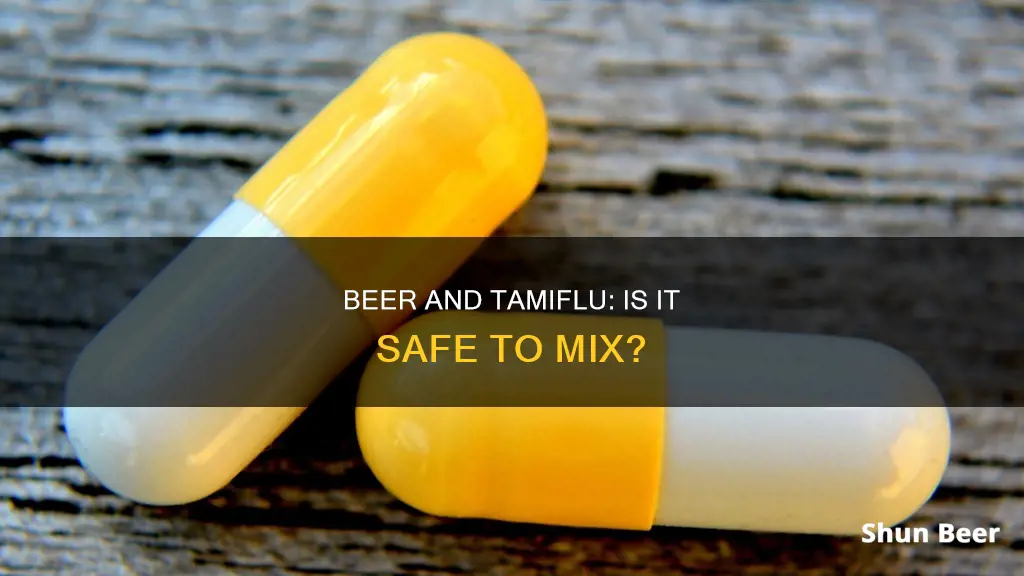
Drinking alcohol while taking Tamiflu is not recommended. Although there is no direct interaction between the two substances, alcohol can decrease immune function and worsen side effects of Tamiflu, such as nausea, vomiting, and headaches. It can also lead to dehydration, interrupt normal sleep, and hinder the body's natural ability to heal itself. Additionally, alcohol can impair the immune system, making it harder to recover from an illness, and can have dangerous interactions with over-the-counter cold and flu medications. Therefore, it is generally advisable to avoid drinking alcohol while taking any medication for colds, flu, pain relief, or sleep aids.
| Characteristics | Values |
|---|---|
| Is it safe to drink beer while taking Tamiflu? | There is no direct interaction between Tamiflu and alcohol, but drinking alcohol while sick is generally not recommended. |
| Why is drinking alcohol while taking Tamiflu not recommended? | Alcohol can decrease immune function, worsen side effects of Tamiflu, and impair the body's natural ability to heal. |
| What are the side effects of Tamiflu that alcohol may worsen? | Headache, nausea, and vomiting. |
| What are the risks of drinking alcohol while sick? | Dehydration, interrupted sleep, and hindered healing. |
What You'll Learn
- Tamiflu and alcohol do not interact directly, but alcohol may worsen side effects of Tamiflu
- Drinking alcohol while sick is generally not recommended as it can lead to dehydration and hinder recovery
- Alcohol may worsen flu symptoms such as nausea, vomiting and headaches
- Alcohol can impair the immune system, making it harder to recover from an illness
- Alcohol can have dangerous interactions with over-the-counter cold and flu medications

Tamiflu and alcohol do not interact directly, but alcohol may worsen side effects of Tamiflu
Tamiflu is an antiviral medication used to treat influenza A and B. It is one of the few flu medications that are recommended for pregnant women due to its limited side effects. However, it is important to note that Tamiflu should be started as soon as possible once flu symptoms begin, ideally within the first 48 hours, for it to be most effective.
While there is no direct interaction between Tamiflu and alcohol, consuming alcohol while taking Tamiflu is generally not recommended. Alcohol can decrease immune function and may worsen some of the side effects of Tamiflu, such as nausea, vomiting, and headaches. It is crucial to stay well-hydrated and get plenty of rest when recovering from an infection, and alcohol can have the opposite effect, leading to dehydration.
Additionally, alcohol can impair the body's ability to break down and metabolize Tamiflu, reducing its effectiveness. Alcohol inhibits the enzyme CES1, which is responsible for metabolizing Tamiflu, leading to a build-up of the drug in the body. This accumulation can expose individuals to the toxic side effects of the medication.
Furthermore, alcohol can have similar side effects to those experienced when taking Tamiflu, such as headache, fatigue, and stomach upset. Combining the two may intensify these side effects and prolong the recovery process. Therefore, it is generally advisable to avoid consuming alcohol while taking Tamiflu to ensure optimal recovery and minimize potential side effects.
It is also worth noting that combining alcohol with certain over-the-counter cold and flu medications can have dangerous interactions and increase the risk of side effects. It is always recommended to consult with a healthcare professional or pharmacist before mixing any substances with medication.
Beer and Gabapentin: A Safe Mix?
You may want to see also

Drinking alcohol while sick is generally not recommended as it can lead to dehydration and hinder recovery
Drinking alcohol while being sick is generally not recommended, especially when taking medication such as Tamiflu. While there is no direct interaction between Tamiflu and alcohol, consuming alcohol while sick can lead to several issues that may hinder your recovery.
Firstly, alcohol can dehydrate you, worsening flu symptoms and prolonging recovery. When you are sick, it is crucial to stay well-hydrated, and alcohol has a diuretic effect, causing your body to expel fluids more rapidly. This can leave you feeling even weaker and prolong the time it takes for you to get better.
Secondly, alcohol can impair your immune system, making it harder for your body to fight off the illness. This is particularly important when taking medications like Tamiflu, which help your body combat the infection. By weakening your immune system, alcohol may counteract the effects of the medication.
Additionally, alcohol can worsen the side effects of Tamiflu, such as nausea, vomiting, and headaches. It can also lead to respiratory depression, feelings of dissociation, brain lesions, epilepsy, or permanent psychosis. Alcohol may also lengthen your recovery time from the flu.
Moreover, combining alcohol with over-the-counter cold and flu medications can have dangerous interactions and severe side effects. Certain medications, like cough suppressants and antihistamines, can increase the risk of dizziness, drowsiness, impaired coordination, and respiratory depression when mixed with alcohol.
Lastly, drinking alcohol while sick can interrupt normal sleep patterns and hinder the body's natural ability to heal itself. Getting enough rest is essential for recovery, and alcohol can disrupt your sleep, leaving you feeling more tired and prolonging the healing process.
In conclusion, while there may be no direct interaction between Tamiflu and alcohol, drinking alcohol while being sick and taking medication is generally not recommended. It can lead to dehydration, impair your immune system, worsen side effects, and disrupt your body's natural healing process. It is best to abstain from alcohol until you have fully recovered and are feeling back to normal.
Beer and Methylprednisolone: Is It Safe to Drink?
You may want to see also

Alcohol may worsen flu symptoms such as nausea, vomiting and headaches
Alcohol may worsen flu symptoms such as nausea, vomiting, and headaches. Nausea and vomiting are common symptoms of alcohol withdrawal, typically occurring 6 to 24 hours after the last drink. Alcohol irritates the stomach lining, causing a buildup of acid that leads to nausea and stomach discomfort. It can also cause gastrointestinal irritation, increasing acid release and irritating the stomach lining, which can result in vomiting. Additionally, alcohol can disrupt sleep, causing fatigue and tiredness, which are common flu symptoms.
The side effects of alcohol consumption include headache, fatigue, and stomach upset, which are similar to flu symptoms. Drinking alcohol while sick can make you feel even worse. Alcohol can also dehydrate you, worsening flu symptoms and prolonging recovery. Dehydration can affect your body's ability to function and can damage your kidneys. It is crucial to prevent dehydration by staying hydrated and drinking clear liquids.
It is generally not advisable to drink alcohol while fighting an infection. Alcohol may hinder the body's natural healing process and can lead to dehydration and interrupted sleep. Therefore, it is best to avoid drinking alcohol while taking Tamiflu or other flu medications to ensure a smooth recovery.
Drinking Beer in Your Car: Pennsylvania's Laws
You may want to see also

Alcohol can impair the immune system, making it harder to recover from an illness
Drinking alcohol while taking Tamiflu is not recommended. While there are no direct interactions between alcohol and Tamiflu, alcohol may worsen flu symptoms and medication side effects. Drinking alcohol while fighting an infection may not be wise, as it can lead to dehydration, interrupt normal sleep, and hinder the body's natural ability to heal itself.
Drinking alcohol has a negative impact on both parts of the immune system. Even a single session of drinking 5-6 drinks can suppress the immune system for up to 24 hours. Over time, drinking can lead to longer-term problems, as the immune system takes longer to recognize and respond to infections. This can result in more intense illnesses, longer-lasting symptoms, and an increased burden on the immune system to fight off infections.
Alcohol consumption can also impact the lungs and the gut. Excessive drinking can affect the immune cells that protect the lungs and the cells within the airways, reducing their ability to remove mucus. This can damage lung tissue and weaken lung function over time, increasing the risk of developing serious conditions such as pneumonia.
Additionally, alcohol can disrupt the balance of 'good' bacteria in the gastrointestinal (GI) tract, which is essential for healthy immune function. It can also damage the cells that make up the lining of the GI tract, contributing to the development of alcohol liver disease.
To protect your health and immune system, it is advisable to drink less alcohol or abstain from drinking altogether. Lowering alcohol consumption can reduce the risk of negative impacts on the immune system and overall health.
Drinking Beer While on Shrooms: Safe or Risky?
You may want to see also

Alcohol can have dangerous interactions with over-the-counter cold and flu medications
Drinking alcohol while taking medication for a cold or flu is not recommended, as it can lead to dangerous interactions and side effects. While there are no direct interactions between alcohol and the flu shot or flu medications like Tamiflu, alcohol may worsen flu symptoms and medication side effects. Additionally, alcohol can have harmful interactions with over-the-counter cold and flu medications, which can lead to serious complications.
Alcohol can cause negative side effects such as nausea, vomiting, headaches, drowsiness, fainting, loss of coordination, internal bleeding, heart problems, and breathing difficulties. When combined with cold and flu medications, these side effects may be intensified, increasing the risk of accidents, falls, and injuries.
Over-the-counter cold and flu medications that interact with alcohol include:
- Acetaminophen (Tylenol): When combined with alcohol, it can cause serious liver problems.
- Antihistamines: Medications like diphenhydramine (Benadryl) and chlorpheniramine can worsen sleepiness and dizziness when taken with alcohol, increasing the risk of falls and injuries.
- Histamine-2 antagonists: Medications like cimetidine (Tagamet) can stop certain enzymes in the stomach from breaking down alcohol, leading to higher blood alcohol levels.
- Nonsteroidal anti-inflammatory drugs (NSAIDs): Medications like ibuprofen (Motrin, Advil) and naproxen (Aleve) can increase the risk of gastrointestinal bleeding when combined with alcohol.
- OTC cough syrups: Many liquid OTC cold medicines, such as NyQuil, contain alcohol, and taking them with alcoholic beverages can raise blood alcohol levels.
It is important to read the labels on medication bottles and avoid consuming alcohol while taking over-the-counter cold and flu medications to prevent harmful interactions and side effects.
Beer and Coke: A Match Made in Heaven?
You may want to see also
Frequently asked questions
There is no direct interaction between Tamiflu and alcohol, but drinking alcohol while recovering from an illness is not recommended. Alcohol can decrease immune function, lead to dehydration, interrupt normal sleep, and worsen side effects of Tamiflu such as nausea, vomiting, and headaches.
Common side effects of Tamiflu include headache, nausea, vomiting, and diarrhoea.
It is not recommended to mix alcohol with other flu medications such as NyQuil or Coricidin due to potential drug interactions and increased side effects.
Xofluza (baloxavir) is another antiviral medication that can be used to treat influenza. It is important to consult a healthcare professional to determine the most appropriate treatment option.







